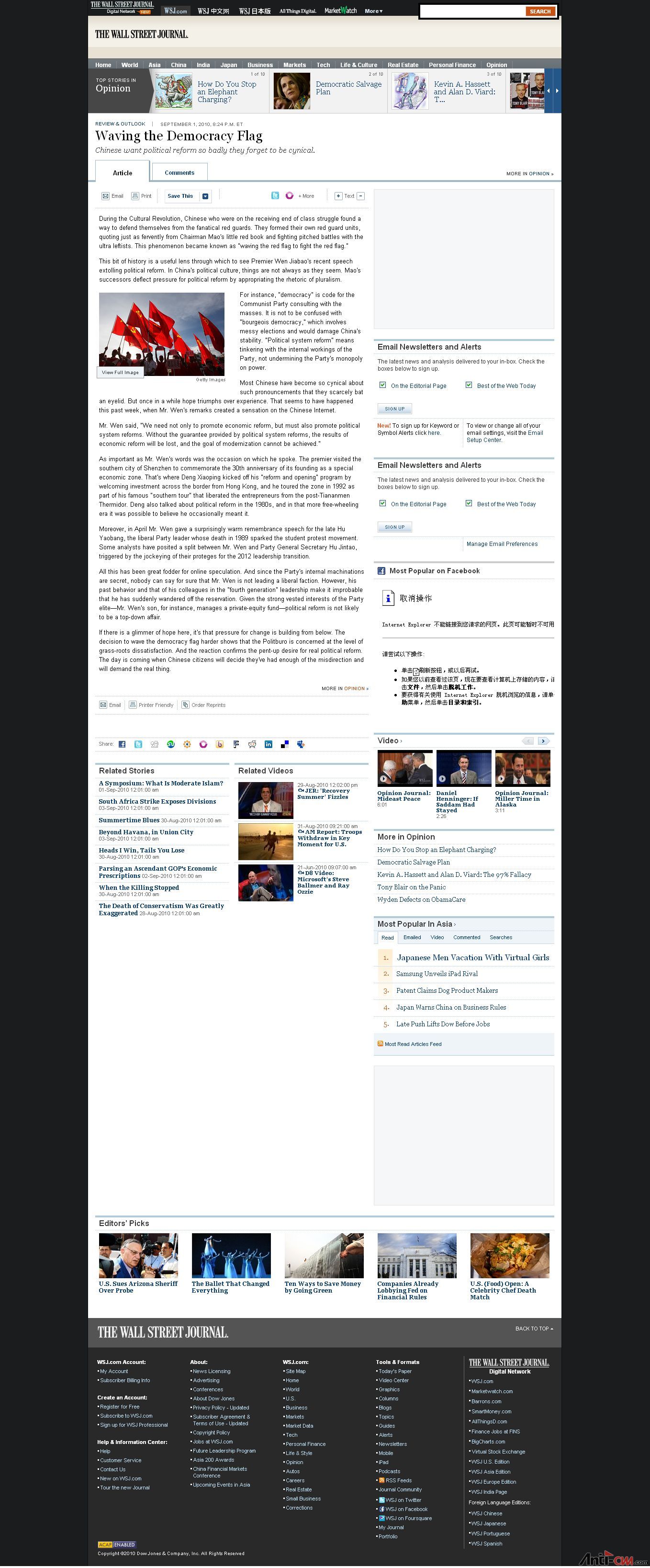|
|
Waving the Democracy Flag
During the Cultural Revolution, Chinese who were on the receiving end of class struggle found a way to defend themselves from the fanatical red guards. They formed their own red guard units, quoting just as fervently from Chairman Mao's little red book and fighting pitched battles with the ultra leftists. This phenomenon became known as "waving the red flag to fight the red flag."
This bit of history is a useful lens through which to see Premier Wen Jiabao's recent speech extolling political reform. In China's political culture, things are not always as they seem. Mao's successors deflect pressure for political reform by appropriating the rhetoric of pluralism.
For instance, "democracy" is code for the Communist Party consulting with the masses. It is not to be confused with "bourgeois democracy," which involves messy elections and would damage China's stability. "Political system reform" means tinkering with the internal workings of the Party, not undermining the Party's monopoly on power.
Most Chinese have become so cynical about such pronouncements that they scarcely bat an eyelid. But once in a while hope triumphs over experience. That seems to have happened this past week, when Mr. Wen's remarks created a sensation on the Chinese Internet.
Mr. Wen said, "We need not only to promote economic reform, but must also promote political system reforms. Without the guarantee provided by political system reforms, the results of economic reform will be lost, and the goal of modernization cannot be achieved."
As important as Mr. Wen's words was the occasion on which he spoke. The premier visited the southern city of Shenzhen to commemorate the 30th anniversary of its founding as a special economic zone. That's where Deng Xiaoping kicked off his "reform and opening" program by welcoming investment across the border from Hong Kong, and he toured the zone in 1992 as part of his famous "southern tour" that liberated the entrepreneurs from the post-Tiananmen Thermidor. Deng also talked about political reform in the 1980s, and in that more free-wheeling era it was possible to believe he occasionally meant it.
Moreover, in April Mr. Wen gave a surprisingly warm remembrance speech for the late Hu Yaobang, the liberal Party leader whose death in 1989 sparked the student protest movement. Some analysts have posited a split between Mr. Wen and Party General Secretary Hu Jintao, triggered by the jockeying of their proteges for the 2012 leadership transition.
All this has been great fodder for online speculation. And since the Party's internal machinations are secret, nobody can say for sure that Mr. Wen is not leading a liberal faction. However, his past behavior and that of his colleagues in the "fourth generation" leadership make it improbable that he has suddenly wandered off the reservation. Given the strong vested interests of the Party elite—Mr. Wen's son, for instance, manages a private-equity fund—political reform is not likely to be a top-down affair.
If there is a glimmer of hope here, it's that pressure for change is building from below. The decision to wave the democracy flag harder shows that the Politburo is concerned at the level of grass-roots dissatisfaction. And the reaction confirms the pent-up desire for real political reform. The day is coming when Chinese citizens will decide they've had enough of the misdirection and will demand the real thing.
原文链接:http://online.wsj.com/article/SB10001424052748703882304575465092570633742.html?mod=asia_home#articleTabs=article

|
democracy, flag, Waving, 华尔街日报, democracy, flag, Waving, 华尔街日报, democracy, flag, Waving, 华尔街日报
|